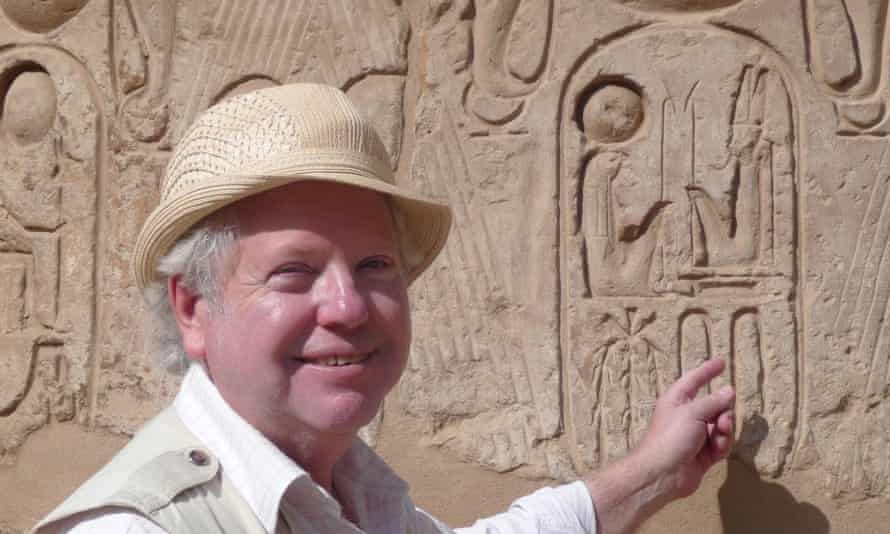https://www.theguardian.com/science/2021/mar/07/george-hart-obituary
Last modified on Sun 7 Mar 2021 12.01 EST
My friend George Hart, who has died aged 75 of cancer, was one of Britain's leading educators about Egypt. If you walked through the Egyptian sculpture gallery at the British Museum and saw a large crowd of people being addressed by someone you could barely see, it had to be George conducting a gallery talk. There was rarely an empty seat when he lectured.
George was born in Dunfermline, the son of Horace Hart, known as Harry, an underwriter's clerk, and his wife, Lillian (nee Smith), a secretary. The family moved south when George was a child and he attended East Ham grammar school. He studied Classics and Egyptology at University College London, where he was greatly inspired by Professor Harry Smith, the Egyptologist, who became a mentor.
After graduating, in 1973 he was appointed a staff lecturer for Egypt and the classical world at the British Museum, a post he held until his retirement in 2004. He inspired many to go on to study ancient Egypt at university; he was very generous with his advice. His courses on Egyptian hieroglyphs were always oversubscribed and gave hundreds of people the opportunity to read the language in museums and on site.
George wrote books mainly aimed at a general audience, but imbued with up to date scholarship, such as his two-volume The Pharaohs (2010), Dictionary of Egyptian Gods and Goddesses (1986), books for travellers such as Pharaohs and Pyramids (1991), and several books for children.
He served on the Council of the Egyptian Exploration Society for many years and on the editorial board of its magazine, Egyptian Archaeology. He was one of the founding members of the Friends of the Petrie Museum at UCL in 1988, and also served on the committee of the Sudan Archaeological Research Society.
Probably most in his element when guiding travellers as one of the leading lecturers on Swan Hellenic cruises around the Mediterranean, Red Sea and Egypt, George endeared himself to thousands of passengers. He also worked for the British Museum's own travel company and later for Noble Caledonia.
After his retirement from the British Museum, he continued to lecture until lockdown and was due to travel and give his talks for Noble Caledonia later this year.
George was an open-hearted and gentle person with a wicked sense of humour and a love of a glass of wine. There was absolutely no room for academic pomposity in his world, where his study of ancient Egypt was serious but fun.
As 2021 unfolds ...
... we have a small favour to ask. You've read
in the last year. And you're not alone; through these turbulent and challenging times, millions rely on the Guardian for independent journalism that stands for truth and integrity. Readers chose to support us financially more than 1.5 million times in 2020, joining existing supporters in 180 countries.
For 2021, we're committing to another year of high-impact reporting that can counter misinformation and offer an authoritative, trustworthy source of news for everyone. With no shareholders or billionaire owner, we set our own agenda and provide independent journalism that's free from commercial and political influence. When it's never mattered more, we can investigate and challenge without fear or favour.
Unlike many others, we have never put up a paywall. We have chosen to keep Guardian journalism free and open for all readers, regardless of where they live or what they can afford to pay. We do this because we believe everyone deserves to read accurate news and thoughtful analysis.
In the last year alone, we offered readers a comprehensive, international perspective on critical events – from the Black Lives Matter protests, to the US presidential election, Brexit, and the ongoing pandemic. We enhanced our reputation for urgent, powerful reporting on the climate emergency, and made the decision to reject advertising from fossil fuel companies, divest from the oil and gas industries, and set a course to achieve net zero emissions by 2030.
If there were ever a time to join us, it is now. Every contribution, however big or small, powers our journalism and helps sustain our future. Support the Guardian from as little as $1 – it only takes a minute. Thank you.
-- Sent from my Linux system.

No comments:
Post a Comment